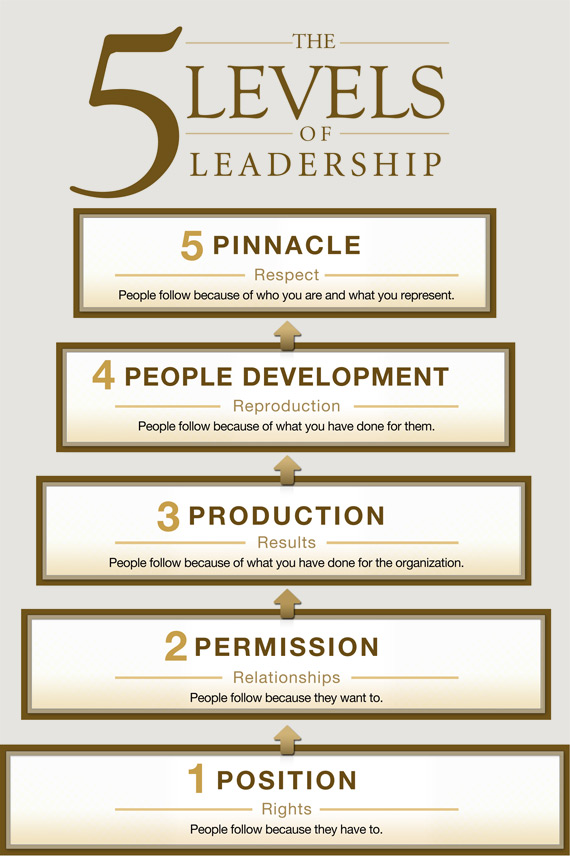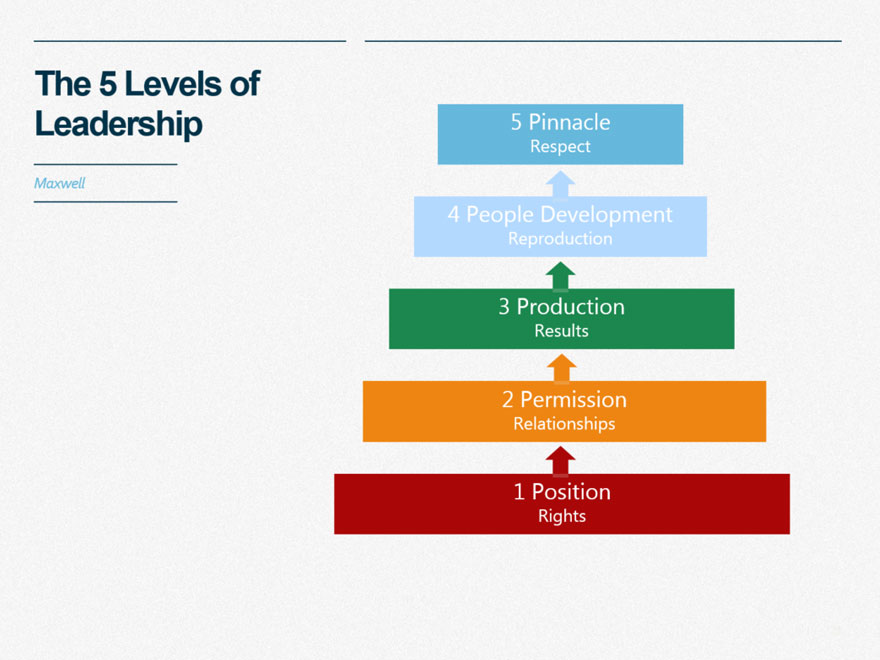January 2, 2019
The 5 Levels of Leadership by John C. Maxwell describes a leadership framework which I’ve explored in two posts before. Here they are combined.
This post is based on the leadership guru/expert John Maxwell and his talk about The 5 Levels of Leadership. Go watch it here https://www.youtube.com/watch?v=aPwXeg8ThWI
“Leadership is influence” – John Maxwell
According to John Maxwell leadership consists of 5 levels. Each level builds on the last one, and the higher the level, the better a leader you are! Let us get right into it:
5. Pinnacle Leadership – Respect: people follow you because they respect you!
People follow you because who you are, because of what you have achieved. This level is only achieved by a small number of people.
Upside: Your reputation allows your message to spread further.
Downside: Nope, not here!
Telltale signs. People respect you
4. People Development Leadership – Reproduction: people follow you because you are developing them!
You train people, you shown them how it is done and how they can show others.
Upside: You transfer your skills to others and start growing your company.
Downside: If there is any – it is that the development is not going automatically yet.
Telltale signs. People are learning, developing, growing.
3. Productive Leadership – Results: people follow you because you give the right example!
You are the example for the rest of the employees. You start gaining credibility because you show you know what to do. “We attract who we are, not who we want”. You create momentum, people get going because of you and keep on going when faced with hurdles.
Upside: You produce, you are an effective leader. Level 3 leadership takes care of 80% of the problems in your organisation.
Downside: You are teaching no one about leadership.
Telltale signs: Things get done, problems get solved.
2. Relationship Leadership – Permission: people follow you because they want to!
You 1) listen well, 2) observe, and 3) learn. You have an attitude of servanthood.
Upside: People like you for being their leader. It is the foundation of leadership.
Downside: Next to being likeable, not much is happening.
Telltale signs: People like you for who you are as the attentive leader
1. Positional Leadership – Rights: people follow you because they have to!
]Upside: You start on your leadership journey, you will learn how to become a true leader.
Downside: The people who follow you will give you the least amount of energy, time and attention.
Telltale signs: People start cleaning their desk at 4:30, start saying goodbye at 4:45, and leave at 5:00 PM, not a minute later.
So on what level am I?
You are not on the same level with everyone. With some people you are on level 1, with others you are on level 3.
The take-home message is: start developing these relationships to grow to the next level.
More Momentum
Momentum can be the driving force behind your leadership. Why, you ask?… Here is an example:
Momentum: Imagine you are riding a train going at 80KM an hour. In the distance is a concrete wall, 20cm thick. Your train continues at 80KM an hour and hits the wall. And without slowing down you keep on going, your momentum has blasted you through the wall.
No Momentum: Imagine you are riding a train, a train that still has to leave the station. In front of you is a concrete wall, 1cm thick. Your train wants to start moving, want to leave. But all that happens is that you are stuck behind the 1cm concrete wall.
More on Development of People
1. Recruitment – The better people you bring in the door, the better chance of success you have. 80% of success of your people is at the front door.
2. Positioning – Get people in the right seat (on the bus). Let them work the sweat spot. They work their strengths. Successful leaders position others well.
John Maxwell explains that in his high school football team the first team was invited to play the second team. The only rule was that they could not play their position. The offense became defense and viceversa. And now you can probably guess who won.
3. Equip – First learn it yourself, then do it together (be a mentor), then let the other person do it (observe, tweak, improve), then let them do it alone, and then – let them explain it to others!
References & Further Reading:
1. https://www.youtube.com/watch?v=aPwXeg8ThWI thanks to Rens Dimmendaal for recommending the video!
2. http://www.iequip.org/
##
“A leader is one who knows the way, goes the way, and shows the way.” – John Maxwell
The 5 Levels of Leadership is a framework for leadership in almost any situation;
Why
The first day on the job as a leader doesn’t make you a leader. It may say so on your business card, but people won’t follow you through the gates of hell, heck they may even start packing their bags at 4.45 PM. The 5 Levels of Leadership explain how you can become a better leader and in effect make better leaders out of the people who follow you. It’s a lifelong journey, one that I most highly recommend you take.
5 Levels of Leadership
- Positional Leadership – Rights: people follow you because they have to!
- Relationship Leadership – Permission: people follow you because they want to!
- Productive Leadership – Results: people follow you because you give the right example!
- People Development Leadership – Reproduction: people follow you because you are developing them!
- Pinnacle Leadership – Respect: people follow you because they respect you!
Now lets see how the levels of leadership can apply to you as a brand-new leader of a group of about 12 people during a week long event.
1) Positional Leadership
You’re assigned leader of a group. Congratulations, this is the first step to becoming a leader. During the opening ceremony you’ve met the members of your group and they are being told that they have to follow you. But what if they discover that no-one will check if they switch groups, what keeps them from leaving your group? Actually nothing, without a relationship between you and the people you lead, they will only follow you until a new opportunity arises.
2) Relationship Leadership
The second level of leadership is relationship building. This can be done by 1) listening well, 2) observing your group, and 3) learning on the go. This level has also been called servant leadership, you serve the group and build connections. People will follow you because they want to. Your group now has become fun, maybe cozy (or as we Dutch like to call it ‘gezellig’), but you are not yet productive.
3) Productive Leadership
To become productive you have to give the right example. If you start by disregarding the program, showing up late in the morning or drinking excessively, your group will get nowhere. Leadership expert John Maxwell said “We attract who we are, not who we want”, I think this applies not only to people, but also to their behaviour. If there are challenges, group assignments or other things that require teamwork, a level 3 leader (and his or her team) will be the ones to win it.
4) People Development Leadership
A week is very short time to develop people. It’s too short to show people how to do the work/study/etc. But it’s long enough to help them become good social people. If you take an effort in learning their names, explain to them the benefits of remembering the names of others. If you are respectful about differences, show them how they can copy that behaviour. At this level people follow you because you are developing them.
5) Pinnacle Leadership
The final level of leadership is something that is developed over a long time. This is a level that can be obtained by developing people, being productive and having great relationships over a long period of time. The organizer of the week long event may be very well the only one who reaches this level. At this level your track record speaks for itself and people follow you because they respect you.
When to Use
Use this framework right now! Think about what level leader you are right now. Is this different at home than at work? And how can you advance your level, what do you need to improve on to become a better leader? Good luck!
“Leaders must be close enough to relate to others, but far enough ahead to motivate them.” – John Maxwell



